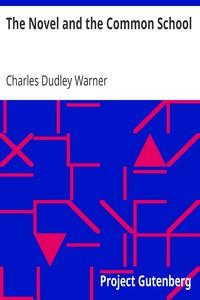Read this ebook for free! No credit card needed, absolutely nothing to pay.
Words: 10033 in 2 pages
This is an ebook sharing website. You can read the uploaded ebooks for free here. No credit cards needed, nothing to pay. If you want to own a digital copy of the ebook, or want to read offline with your favorite ebook-reader, then you can choose to buy and download the ebook.
THE NOVEL AND THE COMMON SCHOOL
There has been a great improvement in the physical condition of the people of the United States within two generations. This is more noticeable in the West than in the East, but it is marked everywhere; and the foreign traveler who once detected a race deterioration, which he attributed to a dry and stimulating atmosphere and to a feverish anxiety, which was evident in all classes, for a rapid change of condition, finds very little now to sustain his theory. Although the restless energy continues, the mixed race in America has certainly changed physically for the better. Speaking generally, the contours of face and form are more rounded. The change is most marked in regions once noted for leanness, angularity, and sallowness of complexion, but throughout the country the types of physical manhood are more numerous; and if women of rare and exceptional beauty are not more numerous, no doubt the average of comeliness and beauty has been raised. Thus far, the increase of beauty due to better development has not been at the expense of delicacy of complexion and of line, as it has been in some European countries. Physical well-being is almost entirely a matter of nutrition. Something is due in our case to the accumulation of money, to the decrease in an increasing number of our population of the daily anxiety about food and clothes, to more leisure; but abundant and better-prepared food is the direct agency in our physical change. Good food is not only more abundant and more widely distributed than it was two generations ago, but it is to be had in immeasurably greater variety. No other people existing, or that ever did exist, could command such a variety of edible products for daily consumption as the mass of the American people habitually use today. In consequence they have the opportunity of being better nourished than any other people ever were. If they are not better nourished, it is because their food is badly prepared. Whenever we find, either in New England or in the South, a community ill-favored, dyspeptic, lean, and faded in complexion, we may be perfectly sure that its cooking is bad, and that it is too ignorant of the laws of health to procure that variety of food which is so easily obtainable. People who still diet on sodden pie and the products of the frying-pan of the pioneer, and then, in order to promote digestion, attempt to imitate the patient cow by masticating some elastic and fragrant gum, are doing very little to bring in that universal physical health or beauty which is the natural heritage of our opportunity.
Now, what is the relation of our intellectual development to this physical improvement? It will be said that the general intelligence is raised, that the habit of reading is much more widespread, and that the increase of books, periodicals, and newspapers shows a greater mental activity than existed formerly. It will also be said that the opportunity for education was never before so nearly universal. If it is not yet true everywhere that all children must go to school, it is true that all may go to school free of cost. Without doubt, also, great advance has been made in American scholarship, in specialized learning and investigation; that is to say, the proportion of scholars of the first rank in literature and in science is much larger to the population than a generation ago.
But what is the relation of our general intellectual life to popular education? Or, in other words, what effect is popular education having upon the general intellectual habit and taste? There are two ways of testing this. One is by observing whether the mass of minds is better trained and disciplined than formerly, less liable to delusions, better able to detect fallacies, more logical, and less likely to be led away by novelties in speculation, or by theories that are unsupported by historic evidence or that are contradicted by a knowledge of human nature. If we were tempted to pursue this test, we should be forced to note the seeming anomaly of a scientific age peculiarly credulous; the ease with which any charlatan finds followers; the common readiness to fall in with any theory of progress which appeals to the sympathies, and to accept the wildest notions of social reorganization. We should be obliged to note also, among scientific men themselves, a disposition to come to conclusions on inadequate evidence--a disposition usually due to one-sided education which lacks metaphysical training and the philosophic habit. Multitudes of fairly intelligent people are afloat without any base-line of thought to which they can refer new suggestions; just as many politicians are floundering about for want of an apprehension of the Constitution of the United States and of the historic development of society. An honest acceptance of the law of gravitation would banish many popular delusions; a comprehension that something cannot be made out of nothing would dispose of others; and the application of the ordinary principles of evidence, such as men require to establish a title to property, would end most of the remaining. How far is our popular education, which we have now enjoyed for two full generations, responsible for this state of mind? If it has not encouraged it, has it done much to correct it?
The other test of popular education is in the kind of reading sought and enjoyed by the majority of the American people. As the greater part of this reading is admitted to be fiction, we have before us the relation of the novel to the common school. As the common school is our universal method of education, and the novels most in demand are those least worthy to be read, we may consider this subject in two aspects: the encouragement, by neglect or by teaching, of the taste that demands this kind of fiction, and the tendency of the novel to become what this taste demands.
Before considering the common school, however, we have to notice a phenomenon in letters--namely, the evolution of the modern newspaper as a vehicle for general reading-matter. Not content with giving the news, or even with creating news and increasing its sensational character, it grasps at the wider field of supplying reading material for the million, usurping the place of books and to a large extent of periodicals. The effect of this new departure in journalism is beginning to attract attention. An increasing number of people read nothing except the newspapers. Consequently, they get little except scraps and bits; no subject is considered thoroughly or exhaustively; and they are furnished with not much more than the small change for superficial conversation. The habit of excessive newspaper reading, in which a great variety of topics is inadequately treated, has a curious effect on the mind. It becomes demoralized, gradually loses the power of concentration or of continuous thought, and even loses the inclination to read the long articles which the newspaper prints. The eye catches a thousand things, but is detained by no one. Variety, which in limitations is wholesome in literary as well as in physical diet, creates dyspepsia when it is excessive, and when the literary viands are badly cooked and badly served the evil is increased. The mind loses the power of discrimination, the taste is lowered, and the appetite becomes diseased. The effect of this scrappy, desultory reading is bad enough when the hashed compound selected is tolerably good. It becomes a very serious matter when the reading itself is vapid, frivolous, or bad. The responsibility of selecting the mental food for millions of people is serious. When, in the last century, in England, the Society for the Diffusion of Useful Information, which accomplished so much good, was organized, this responsibility was felt, and competent hands prepared the popular books and pamphlets that were cheap in price and widely diffused. Now, it happens that a hundred thousand people, perhaps a million in some cases, surrender the right of the all-important selection of the food for their minds to some unknown and irresponsible person whose business it is to choose the miscellaneous reading-matter for a particular newspaper. His or her taste may be good, or it may be immature and vicious; it may be used simply to create a sensation; and yet the million of readers get nothing except what this one person chooses they shall read. It is an astonishing abdication of individual preference. Day after day, Sunday after Sunday, they read only what this unknown person selects for them. Instead of going to the library and cultivating their own tastes, and pursuing some subject that will increase their mental vigor and add to their permanent stock of thought, they fritter away their time upon a hash of literature chopped up for them by a person possibly very unfit even to make good hash. The mere statement of this surrender of one's judgment of what shall be his intellectual life is alarming.
But the modern newspaper is no doubt a natural evolution in our social life. As everything has a cause, it would be worth while to inquire whether the encyclopaedic newspaper is in response to a demand, to a taste created by our common schools. Or, to put the question in another form, does the system of education in our common schools give the pupils a taste for good literature or much power of discrimination? Do they come out of school with the habit of continuous reading, of reading books, or only of picking up scraps in the newspapers, as they might snatch a hasty meal at a lunch-counter? What, in short, do the schools contribute to the creation of a taste for good literature?
Great anxiety is felt in many quarters about the modern novel. It is feared that it will not be realistic enough, that it will be too realistic, that it will be insincere as to the common aspects of life, that it will not sufficiently idealize life to keep itself within the limits of true art. But while the critics are busy saying what the novel should be, and attacking or defending the fiction of the previous age, the novel obeys pretty well the laws of its era, and in many ways, especially in the variety of its development, represents the time. Regarded simply as a work of art, it may be said that the novel should be an expression of the genius of its writer conscientiously applied to a study of the facts of life and of human nature, with little reference to the audience. Perhaps the great works of art that have endured have been so composed. We may say, for example, that "Don Quixote" had to create its sympathetic audience. But, on the other hand, works of art worthy the name are sometimes produced to suit a demand and to please a taste already created. A great deal of what passes for literature in these days is in this category of supply to suit the demand, and perhaps it can be said of this generation more fitly than of any other that the novel seeks to hit the popular taste; having become a means of livelihood, it must sell in order to be profitable to the producer, and in order to sell it must be what the reading public want. The demand and sale are widely taken as the criterion of excellence, or they are at least sufficient encouragement of further work on the line of the success. This criterion is accepted by the publisher, whose business it is to supply a demand. The conscientious publisher asks two questions: Is the book good? and Will it sell? The publisher without a conscience asks only one question: Will the book sell? The reflex influence of this upon authors is immediately felt.
The novel, mediocre, banal, merely sensational, and worthless for any purpose of intellectual stimulus or elevation of the ideal, is thus encouraged in this age as it never was before. The making of novels has become a process of manufacture. Usually, after the fashion of the silk-weavers of Lyons, they are made for the central establishment on individual looms at home; but if demand for the sort of goods furnished at present continues, there is no reason why they should not be produced, even more cheaply than they are now, in great factories, where there can be division of labor and economy of talent. The shoal of English novels conscientiously reviewed every seventh day in the London weeklies would preserve their present character and gain in firmness of texture if they were made by machinery. One has only to mark what sort of novels reach the largest sale and are most called for in the circulating libraries, to gauge pretty accurately the public taste, and to measure the influence of this taste upon modern production. With the exception of the novel now and then which touches some religious problem or some socialistic speculation or uneasiness, or is a special freak of sensationalism, the novels which suit the greatest number of readers are those which move in a plane of absolute mediocrity, and have the slightest claim to be considered works of art. They represent the chromo stage of development.
They must be cheap. The almost universal habit of reading is a mark of this age--nowhere else so conspicuous as in America; and considering the training of this comparatively new reading public, it is natural that it should insist upon cheapness of material, and that it should require quality less than quantity. It is a note of our general intellectual development that cheapness in literature is almost as much insisted on by the rich as by the poor. The taste for a good book has not kept pace with the taste for a good dinner, and multitudes who have commendable judgment about the table would think it a piece of extravagance to pay as much for a book as for a dinner, and would be ashamed to smoke a cigar that cost less than a novel. Indeed, we seem to be as yet far away from the appreciation of the truth that what we put into the mind is as important to our well-being as what we put into the stomach.
No doubt there are more people capable of appreciating a good book, and there are more good books read, in this age, than in any previous, though the ratio of good judges to the number who read is less; but we are considering the vast mass of the reading public and its tastes. I say its tastes, and probably this is not unfair, although this traveling, restless, reading public meekly takes, as in the case of the reading selected in the newspapers, what is most persistently thrust upon its attention by the great news agencies, which find it most profitable to deal in that which is cheap and ephemeral. The houses which publish books of merit are at a disadvantage with the distributing agencies.
Criticism which condemns the common-school system as a nurse of superficiality, mediocrity, and conceit does not need serious attention, any more than does the criticism that the universal opportunity of individual welfare offered by a republic fails to make a perfect government. But this is not saying that the common school does all that it can do, and that its results answer to the theories about it. It must be partly due to the want of proper training in the public schools that there are so few readers of discrimination, and that the general taste, judged by the sort of books now read, is so mediocre. Most of the public schools teach reading, or have taught it, so poorly that the scholars who come from them cannot read easily; hence they must have spice, and blood, and vice to stimulate them, just as a man who has lost taste peppers his food. We need not agree with those who say that there is no merit whatever in the mere ability to read; nor, on the other hand, can we join those who say that the art of reading will pretty surely encourage a taste for the nobler kind of reading, and that the habit of reading trash will by-and-by lead the reader to better things. As a matter of experience, the reader of the namby-pamby does not acquire an appetite for anything more virile, and the reader of the sensational requires constantly more highly flavored viands. Nor is it reasonable to expect good taste to be recovered by an indulgence in bad taste.
Free books android app tbrJar TBR JAR Read Free books online gutenberg
More posts by @FreeBooks










